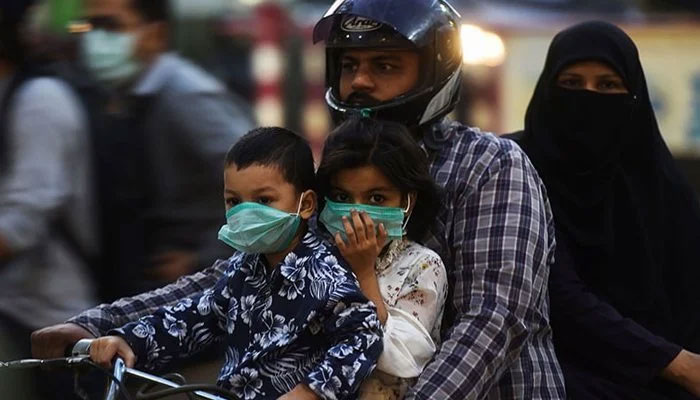Pakistan reports slight slump in COVID-19 positivity rate
NIH says COVID-19 positivity rate has moved down to 2.84%; 156 patients being treated in ICU
August 02, 2022

ISLAMABAD: The positivity ratio dropped to 2.84% in the country, National Institute of Health (NIH) data showed Tuesday morning.
According to the NIH, 392 people were tested positive for COVID-19 after 13,822 tests were conducted in the last 24 hours.
Following the detection of new cases, the COVID-19 positivity ratio declined to 2.84% from 3.35%, which was recorded a day earlier.
Meanwhile, two coronavirus-related deaths were reported in the last 24 hours.
According to the NIH data, 156 COVID-19 patients are being treated in Intensive Care Units (ICU) at different medical facilities across the country.
Pakistanis advised to mask up
With Pakistan logging hundreds of COVID-19 cases every day, the NIH has advised strict adherence to standard operating procedures (SOPs), including mask wearing and social distancing during Muharram gatherings.
Gathering and majalis to remember the Shuhada-e-Karbala (martyrs of Karbala) have started as the country observes the new Islamic year — which began on Sunday.
What are the SOPs for Muharram?
NIH has restricted the elderly and children from attending the gatherings and majalis during Ashura in a COVID-safe manner, as the risk of another outbreak looms with an uptick of the virus across Pakistan.
Following are the guidelines for holding gatherings and processions
- COVID-19 Standard Operating Procedures i.e mask-wearing, social distancing and use of sanitisers/ hand washing should be adhered to
- Organising committees should make arrangements for all SOPs
- Zakirs and participants should be vaccinated against COVID-19
- Venue for conduct of Majalis should be open and spacious with proper
- ventilation arrangements
- Wearing of masks and maintenance of social distancing is mandatory during majalis and Processions. Availability of masks and sanitisers/ hand washes
- Controlled participation according to capacity of venues and avoidance of overcrowding
- Duration of majalis and processions should be curtailed
- Majalis where SOPs cannot be effectively implemented such as
- homes and private gatherings should be discouraged
- Elderly above 65 years, children and co-morbid may be sensitized to
- attend Majalis at home through live streaming
- Proper arrangements for cleaning venues with chlorine before and after the events
- Display of COVID-19 SOPs and precautions at prominent places
- SOPs compliance by employing volunteer scouts
Miscellaneous aspects
- Arrangements for food and drinks in spacious and ventilated place.
- Emphasis on use of disposable utensils; preference on pre-packaged boxes for distribution of food.
- Avoiding overcrowding at food distribution points/locations.
- No handshake and embracing.
Areas of focus
Some of the aspects meriting necessary actions at the federal and federating units level, include following:
- Messaging by religious clerics for uniform implementation of SOPs /guidelines proposed by NCOC.
- Strict enforcement of SOPs by civil administration.









